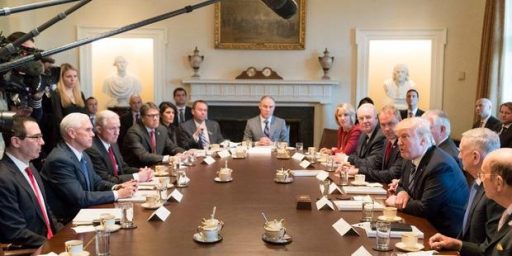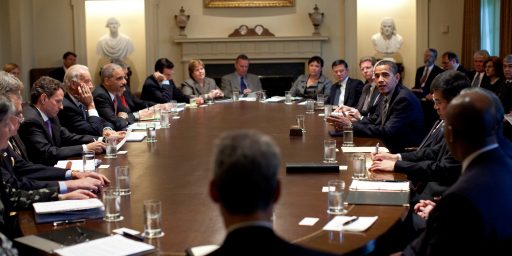American Citizenship Test Flawed
Several "correct" answers on the American citizenship test are technically incorrect.
Dafna Linzer became an American citizen earlier this year. To do so, she had to supply answers she knew were wrong on the official citizenship test.
Take Question 36. It asks applicants to name two members of the president’s Cabinet. Among the correct answers is “Vice President.” The vice president is a cabinet-level officer but he’s not a Cabinet member. Cabinet members are unelected heads of executive departments, such as the Defense Department, or the State Department.
The official naturalization test booklet even hints as much: “The president may appoint other government officials to the cabinet but no elected official may serve on the cabinet while in office.” Note to Homeland Security: The vice president is elected.
Still, a wonderful press officer in the New York immigration office noted that the White House’s own Web site lists the vice president as a member of the Cabinet. It’s still wrong, I explained. I told her that my partner wrote an entire book about the vice president and won a Pulitzer Prize for the stories. I was pretty sure about this one. A parade of constitutional scholars backed me up.
In fact, the Constitution aligns the vice president more closely with the legislative branch as president of the Senate. Not until well into the 20th century did the vice president even attend Cabinet meetings.
Then there is Question 12: What is the “rule of law”?
I showed it to lawyers and law professors. They were stumped.
There are four acceptable answers: “Everyone must follow the law”; “Leaders must obey the law”; “Government must obey the law”; “No one is above the law.”
Judge Richard Posner, the constitutional scholar who serves on the U.S. Court of Appeals in Chicago, was unhappy. “These are all incorrect,” he wrote me. “The rule of law means that judges decide cases ‘without respect of persons,’ that is, without considering the social status, attractiveness, etc. of the parties or their lawyers.”
[…]
My immigration lawyer accompanied me to my interview. In the security line, I told her I was bothered by Question 16: Who makes the federal laws?
Each of the three possible answers, it seemed, was incomplete. The official answers were: “Congress”; “Senate and House (of representatives)”; “(U.S. or national) legislature.” I’m not a lawyer but even Canadians watched Schoolhouse Rock. Where, I wondered, was the president, whose signature is what makes a bill into a law?
My lawyer sighed, she agreed. But: “If you get asked that question, just give the official answer,” she said. I didn’t get that question.
I also wasn’t asked Question 1: What is the supreme law of the land?
The official answer: “the Constitution.” A friend and legal scholar was aghast. That answer, he said, is “no more than one-third correct.” He’s right.
Article VI, clause 2 in the Constitution, known as the Supremacy Clause, explicitly says that three things—the Constitution, federal laws, and treaties—together “shall be the supreme law of the land.”
Question 96 asks: Why does the flag have 13 stripes? The official answer: “because there were 13 original colonies.” In fact, the flag has 13 stripes for the 13 original states.
Some of this is pretty nitpicky. And just because something has a precise definition to a Constitutional lawyer doesn’t mean it doesn’t have a somewhat different meaning in popular usage.
Nor, on an open question test, would I begrudge counting “the Vice President” as an acceptable answer to “Names two cabinet officers.” Modern VPs have, in effect, been cabinet officers. For that matter, I’ve got a PhD in political science with American Politics as one of my minor subfields and couldn’t answer with any certainty whether a variety of officials (the UN Representative, the National Security Advisor, the Chairman of the Council of Economic Advisors, etc.) are technically members of the cabinet, because that’s at the whim of the current president.
Then again, I wouldn’t give people technically wrong answers as part of a study guide.
Of Linzer’s examples, I only find Question 16 particularly annoying: Congress simply doesn’t make the laws by itself.







Pfui. Understanding of the national mythology is as valid as an understanding of the facts. Naturalization is arbitrary not systematic.
Oooh, sore point for me. Yes, some questions on standardized tests are wrong. I got a 790 out of 800 on my English SAT. You know why I only got a 790? Because THEY WERE WRONG!
Wrong!
Not that it still bothers me almost 40 years later. Because that would be really immature.
But for the record? They were wrong.
I’m just sayin . . .
@Dave: As the old Simpsons episode says: “Slavery it is, sir.”
@Michael: By the power vested in me by no one in particular, I hereby award you an 800.
I take the point, although since legislation can pass into law without a president’s signature and since, ultimately (via an over-ridden veto) they can make laws without the president, I don’t find the response especially problematic (especially for a multi-choice question, which is really the make problem here).
And really, they do make the laws while the president has the right to accept or reject them.
@Steven: I think the flaw is really with the study guide more than the test.
And, frankly, any test is flawed when confronted by someone with expert knowledge. I would argue that the president and Supreme Court — and, heck, the various executive agencies — effectively make laws. But that’s a level of knowledge well beyond the target audience.
I took a freshman level Intro to Criminal Justice course as a senior, having already taken two semesters of 400-level Con Law, because it was for some reason required of Poli Sci majors. The prof had this weird policy of allowing people to challenge test questions during the review session and awarding the corresponding points to everyone, regardless of whether they’d gotten the answer “right” initially. I was the most popular guy in the class, routinely scoring 130 points on my own exams and raising the average of the entire class a corresponding amount by arguing technical reasons why other answers were conceivably correct.
Thankfully, the prof had a sense of humor about it.
@James:
Indeed.
Heck, you could throw lobbyists in there as well.
Thanks James.
As I understand it, a blogger’s powers are only slight less than those of the Pope.
What Dave said. As long as folks get the music, I wouldn’t be all that worried about the words.